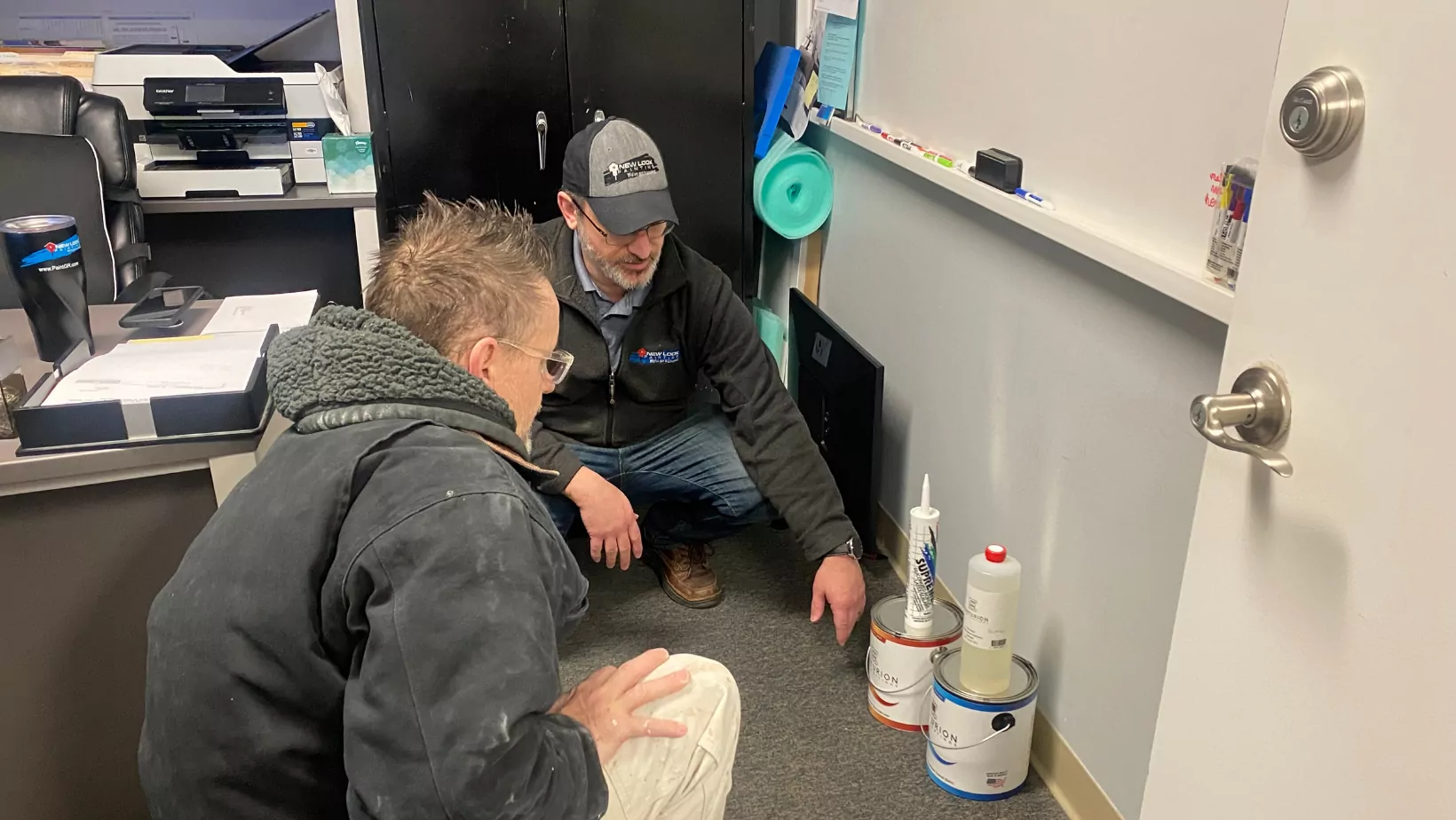A Consumer Awareness Guide Provided by New Look Painting
Your home is quite possibly the biggest investment you’ll ever make and one of your most valuable assets. Choosing a painting contractor to work in your home is no small decision. Before making your selection there are many factors to consider. It is not as simple as choosing a painting contractor who seems experienced and offers the service at an attractive price.
I am providing this guide to help you better understand the painting industry so you know what to look for and which pitfalls to avoid. With this valuable information you’ll be able to choose a good contractor, whether New Look Painting or not, and be happy with the end results. An informed decision is always a more intelligent decision, so this information is for you!
Best Regards,
Mike Beaulieu
Statistically speaking, the construction/home improvement business receives MANY more Better Business Bureau complaints than most other industries. The complaints typically include high pressure sales tactics, poor workmanship, price gouging, or confusion of contract terms. Fortunately, as a consumer, you can avoid these problems by doing a little research before choosing your painting contractor. By educating yourself, you can easily spot the warning signs of a disreputable or unprofessional contractor. From my experience, customers typically ask three questions before deciding on a contractor:
1. What’s the cost?
2. How long will it take?
3. How soon can we get started?

However, there are SO many more factors to consider when deciding to bring a contractor into your home. What are the processes the contractor uses to complete the project? What is the scope of the work? The materials used? Will they be sending their employees or a subcontractor? These questions are seldom asked. Most customers don’t know which questions to ask, or they feel anxious asking the questions. Also, customers often assume that their contractor will be fair and perform highquality work (something that cannot be taken for granted).

This guide is designed to help you become aware of how the painting business works. You will learn which questions to ask and you’ll be able to pose the questions in a more intelligent way. This guide is not meant to help you manage a painting contractor, because if you choose a good painting contractor they will manage themselves without needing to be told what to do. Professional contractors, by definition, have processes and systems in place to ensure their success.
I hope you will read through this guide prior to selecting your next painting contractor. A good contractor will appreciate an educated client and you only stand to gain by having a thorough understanding of this business before spending your hard-earned cash.
#1 – What Makes A Project Successful?
Before selecting a contractor, you need to decide what the standards are. What are you looking for when choosing someone to work in your home? While it’s not an exact science, as a customer there are some clear descriptions of what makes a successful painting project:
- Your expectations were set properly and were met or exceeded
- The work was done with the highest, most long-lasting quality
- You were comfortable with the workers in your home
- Your contractor treated you with respect
- The project added value to your life and home
- You paid a fair price for the value you received
If all these criteria were met, you will probably be completely satisfied with the contractor. It is in everyone’s best interest that the criteria be met, as you will be satisfied and the contractor will likely receive repeat business and/or referrals. The next seven steps will be written with these criteria for a successful project in mind.
#2 – The 5 Most Common Misconceptions About Painting Contractors
I’d like to begin by addressing some of the most common misconceptions people hold when selecting a painting contractor.
1. You should always get three bids.
Not necessarily. This tactic is arguably the most common reason customers end up dissatisfied with the end results of their painting projects. You might be asking WHY? Allow me to explain:
→ Comparing estimates to other estimates can be misleading.
There is no “standard” pricing or “standard” specifications for painting projects. The quotes are a reflection of what is included in the job that the contractor plans to complete for you. It is far too easy to be fooled by a price tag if you don’t consider what the contractor is planning to do and how they plan to do it.
You can’t “test drive” a painting job. You’re buying something that does not yet exist. This makes it impossible to tell how similar one proposed job is from another. When you are purchasing a car, for example, you are comparing prices for the SAME car, built by the same manufacturer. This is not the case with a painting job.
One contractor’s materials and methods are often vastly different than those of a competing contractor, and even building codes don’t protect you from those variances. Oftentimes a contractor isn’t good at communicating exactly what they plan to do, how they plan to do it, and how it varies from other contractors. Don’t assume that all painting contractors are very comparable – you might believe them to be more similar than they actually are. If you use the “drop the highest and lowest bids and go with the middle one” technique, you are much more likely to be disappointed. Rather than using this method, look for a contractor who has a solid reputation.
Before bringing a contractor into your home for a bid, ask around first to see who has a good reputation in your area. Look at online reviews and get recommendations from neighbors, friends, and coworkers. It is very unlikely that a contractor could acquire and maintain a good reputation if they are charging too much for the work they do. They wouldn’t have a solid reputation if their customers felt they were being ripped off. They simply couldn’t fool that many people into believing they are good if they aren’t actually good!
2. Going with the lowest price saves you money.
If you have solicited multiple bids and decide on the lowest one, you have just hired a contractor who has found the cheapest way to get the job done. Is that really what you want? A contractor who is offering to do great work for a very low price may as well be waving a red flag in your face. If it seems to good to be true, it probably is. You really do get what you pay for.
All things being equal, you should go for the lowest price, right? Absolutely! But things are almost never equal in the painting business I highly suggest you consider the details of the proposed bid. The more details the better. Vague plans leave a lot to be discovered AFTER the project has begun. This is not the time for unpleasant surprises. Most of the time the low-bidding contractor has left out something that the higher-bidding contractor has included.
Low-bidding contractors are typically cutting corners and may consider the job to be complete before you are fully satisfied.
In summary: Never use price alone as the determining factor. There are too many other variables to consider.
3. I should buy my own materials to save money.
Most contractors worth their salt will discourage you from supplying your own materials. This is because you are likely to a) purchase the wrong materials or b) not purchase enough. This will cause frustration for the contractors and will cost them time and money. Many contractors will refuse the job if the customer insists on providing their own materials. Sometimes the materials for the project are out of the ordinary so the contractor will allow you to supply the materials. That being said, a contractor cannot offer a warranty on a product they did not supply.
You’re far better off allowing the contractor to bring the materials. This makes the contractor happier and saves you the trouble and hassle. It also avoids any confusion about who is responsible should something go wrong.
4. If the contractor has many years of experience, they must be good.
Don’t assume that a contractor is good simply because they have many years of experience. They could have been doing inferior work for many years. Also, they may have many years of experience, but not in projects that are similar to yours. Reputation is the key. Investigate the contractor’s credentials thoroughly. A good contractor will not boast of their years of experience without providing solid credentials to match.
5. If the contractor is fully insured, I will be adequately protected.
You may be surprised to hear that this is not always the case. Contractors are required to carry two types of insurance: Worker’s Compensation Insurance and Contractor’s Liability Insurance. They are not the same, and they don’t cover the same situations.
Worker’s Compensation Insurance covers you if a person who is
working in your home gets injured. Liability Insurance covers damaged
goods in your home, such as a broken window or damage to your
personal property.
Since personal injuries are far more common than damage to a customer’s personal properly, Worker’s Compensation Insurance is far more expensive than Liability Insurance. There are loopholes that some
contractors use to avoid purchasing Worker’s Compensation Insurance. Without this insurance, you leave yourself dangerously exposed to a lawsuit if the painter becomes injured in your home. Make sure your contractor carries BOTH policies. To be completely sure you can ask to see the certificates of insurance before you sign a contract.

# 3 – Red Flags to be Avoided
Just like all industries, there are scammers and con artists in the painting industry. Spotting a scam artists is relatively easy if you know what to look for. One clue is our natural instinct that tells us that something is “off.” That gut feeling that we shouldn’t trust someone. However, there are also red flags to watch for with honest contractors. Even a seemingly honest contractor can be inexperienced, incompetent, or both. In other words, it’s not just the obviously dishonest contractors you need to watch out for. There is typically no shortage of painters willing to take your job, but here are some things you will want to look out for regardless of which contractor you are considering:
1. High Pressure Sales Tactics
The painting business is competitive, and some contractors are turning to high-pressure sales tactics. You should never feel pressured into make a decision about choosing a contractor. A good contractor understands that you are making a big decision and respects your right to take your time. High pressure sales tactics can lead you into a poor decision.
2. Unusual Payment Terms
A contractor shouldn’t ask you to pay for the whole job upfront, nor should they ask for the payment in cash. A reputable contractor will generally ask for a reasonable deposit (maybe 50% upfront) and then propose a fair payment schedule. There are too many horror stories about contractors who take the money then disappear into the sunset. A fair contractor will propose a mutually acceptable payment plan.
3. Unverifiable Credentials
If you can’t verify the contractor’s company name, contact information, address, etc., you are almost certainly looking at trouble. This could be a “pickup truck builder.” They don’t have a physical location or a verifiable business. You’re dealing with someone who could very easily disappear without a trace. Another tip-off for this type of contractor would be if they have only one mobile phone as a contact number.
4. Unrealistic Discounts
You should question a contractor who is too quick to dramatically reduce their bid when you turn them away. If they’re willing to drop their price by 30% after you decline the bid, this suggests they are dishonest. If you discuss other methods, materials, or circumstances that clearly constitute a drop in cost, that’s different. However, the price quoted should be a fair price and the contractor should stick to it.
5. No Contract or Proposal
A good contractor will supply you, in writing, a clearly defined scope of work, clear specifications, and detailed terms. You should insist on this. Do not assume that something is included unless it is stated in writing. If there is a misunderstanding, you’re left with a “he said, she said” situation that is stressful and can be costly. The document should be thorough and with no incomplete specifications or vague terms.
6. Shoddy or Incomplete Workmanship
When it comes to painting contractors, the most common problem you will run into is shoddy workmanship. This happens with the honest contractors and the bad guys alike. You wouldn’t believe how many sloppy paint jobs I’ve seen over the years. Research shows that approximately 40% of home improvement projects are a rework of a job done by a previous contractor. Furthermore, a study conducted on newly built homes all across the country showed that 94% of new builds were found to have “major flaws.”
To avoid the potential for shoddy workmanship, I recommend doing research on the products that the contractor uses. Ask your contractor what type of paint and tools they use. Don’t hire a contractor who uses poor quality paint and tools. They simply can’t get a good end result if they’re using subpar materials. A contractor who is willing to use poor quality materials is showing that they don’t care enough about the quality of their work. A contractor who insists on quality will not do a sloppy job.
7. Unreasonable Timeframes
Don’t be lured by a contractor who promises an overly optimistic completion date. Chances are they are promising something they cannot deliver. A good contractor will set realistic expectations.
8. No Warranty on the Work
A good warranty is a must to any painting project. In some states painting contractors are not required to warranty their work. Contractors who are committed to quality workmanship and customer satisfaction will warranty their work for a minimum of one year (many offer two years or more). You can check out the Painting and Decorating Contractors Association to research their warranty requirements. The PDCA has some minimum requirements for warranties that a good contractor will adhere to. It is not a bad idea to ask for the contractor’s warranty policy in writing.
#5 – Costly Mistakes Customers Often Make When Hiring a Painter
1. Not Reading Online Reviews
Online reviews cover the gamut of satisfied and dissatisfied customers. When a contractor provides you with references know that you will be speaking with handpicked customers who the contractor knows will speak well of them. They will not provide you with a bad reference. This is not the case with online reviews as you will be seeing the good, the bad, and the ugly.
2. Hiring a Contractor Based on Price Alone
I discussed this earlier in the book, but it bears repeating. If you use pricing alone as the deciding factor on hiring a painter, you are likely to be disappointed. The last thing you want is to realize half way through a project that the\ contractor you chose is doing poor quality work. You might need to spend a little more for quality work but, in the end, you will be glad you did. A reputable contractor will not cut corners or do sloppy work just to save money
3. Not Knowing Which Questions to Ask
Do your homework before hiring a painting contractor. This eBook is a great place to start, and you should also do research on the details of the painting industry. Know the different painting techniques and materials that are used in the business. Study what reasonable timeframes look like. What type of paint/caulk do they use? By doing some basic research you can ask educated questions.

#6 – What to Look for in a Contractor
1. Promptness
When you reach out to your potential contractor, are they prompt in returning your calls? Do they keep their appointments without running late?
2. Trustworthiness
An honest, trustworthy contractor will make sure you are given quality service without ripping you off. You are trusting a contractor to choose the people they will be sending into your home. You are trusting a contractor with a sizable amount of your money. If your gut tells you that you shouldn’t trust the contractor, then don’t.
3. Licenses
In the state of Michigan, when hiring a painter, that contractor is required to have a Builder’s Maintenance and Alterations License for paint projects that total 600 dollars or more in labor and materials. The state does this to protect the interest of the homeowner.
4. Reviews
→ Customer reviews are invaluable.
A good painter’s work will speak for itself. Look at the Better Business Bureau – this is proof of a painter’s responsiveness to complaints and their aim to satisfy their\ customers. Look on other sites such as Google Reviews, Angie’s List, etc. If the contractor is good, their reviews will reflect that. Similarly, a bad contractor won’t be able to avoid a bad online reputation.
#7 – Questions You Should Ask a Contractor Before Hiring Them
1. Are you properly licensed by the state?
2. Do you carry Liability Insurance? Worker’s Compensation Insurance?
3. Are you registered with the Better Business Bureau?
4. Will you provide me with a written contract that outlines all the terms of the job in detail?
5. Do you require all change orders to be in writing? (This eliminates misunderstandings and unexpected cost overruns)
6. What percentage of your business is repeat business? What percentage of your business is referral based?
7. Can you provide me with references?
8. How many projects like mine have you completed in the last 2 years?
9. How do you plan to protect my home from dust and the other potential hazards of your work?
10.How is daily and end-of-job clean up handled?
11.What is your process for picking colors?
12.Does your company have a safety manual?
13.Does your company use employees or subcontractors?

#8 – How to Ensure a Smooth Project
1. Good Communication
Hire a contractor with good communication skills. Your contractor should be responsive – they should call you back and answer emails promptly. They should listen to you and take notes if needed. Your painting contractor should build a strong rapport and close communication with you if they want to secure your business.
2. Scheduling
A reputable contractor will keep you informed on the start date, the initial stages, the progress throughout, and the anticipated completion date of your project.
3. Clear Proposal/Contract
Oftentimes disagreements can be avoided simply by writing things down. Miscommunication happens easily if the details and terms are not clearly spelled out. General terms like “paint the bedroom” are too vague and leave too much room for misunderstandings. Your written contract should include specifications such as how many doors, the number of coats, the prep required, etc. To avoid trouble, absolutely insist on a crystal clear contract agreement.
4. Details
There are some things that may not occur to you prior to bringing a contractor into your home, but they can be very important to the success of your project. Things such as: What time will the work begin and end each day? Where will the materials be stored? How will pets be dealt with? What other special considerations need to be considered?
5. Flexibility
A painting job can be disruptive to your normal lifestyle – this can’t really be avoided. Try to be flexible. Don’t schedule a birthday party or overnight guests while the project is going on or based on the completion date (build in a buffer). Be prepared to make a few sacrifices. If you go into the project knowing that it is going to inconvenience you temporarily, you’re less likely to become frustrated.
6. Change Orders
Changes or additions may occur when it comes to painting in the home. There may be changes made to the materials and the scope of the work once it begins. Something you thought you wanted left out might be something you later wish to include. Almost all changes will affect the cost and the timeline of the project. Make sure all changes are in writing to avoid unpleasant surprises at the end.






